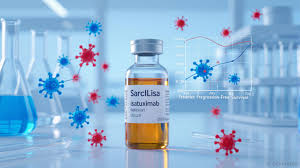28 July 2025 | Monday | News

Following the positive opinion by the European Medicines Agency's Committee for Medicinal Products for Human Use on June 19, 2025, the European Commission has approved Sarclisa in combination with bortezomib, lenalidomide, and dexamethasone (VRd) for the induction treatment of adult patients with newly diagnosed multiple myeloma (NDMM) who are eligible for autologous stem cell transplant.
“We have been on a mission to accelerate Sarclisa’s clinical development program with the hope to bring this important medicine to as many people as possible living with multiple myeloma,” said Olivier Nataf, Global Head of Oncology at Sanofi. “Today’s decision represents a prime example of those efforts, and most importantly, paves the way for Sarclisa to potentially become accessible to even more patients in the EU, regardless of transplant eligibility or line of therapy.”
The approval is based on results from part one of the two-part, double-randomized, German-speaking Myeloma Multicenter Group (GMMG)-HD7 phase 3 study (clinical study identifier: NCT03617731), which was designed to independently assess the effects of Sarclisa during the induction and maintenance phases. Sarclisa-VRd demonstrated a deep and rapid response in transplant-eligible (TE) NDMM patients compared to VRd alone, reflected by a statistically significant minimal residual disease (MRD) negativity benefit at the end of the 18-week induction period, which was the primary endpoint of part one.
These MRD results were supported by the final progression-free survival (PFS) analysis of part one (induction and transplant), which demonstrated a statistically significant and clinically meaningful improvement in PFS in patients treated with Sarclisa-VRd during induction, regardless of the maintenance therapy received. Additionally, the majority (53.1%) of patients receiving Sarclisa-VRd experienced continued MRD negativity (compared to 38% in the control arm), defined as MRD negativity persisting from post-induction to post-transplant, which was consistent with the prolonged PFS benefit.
The results are part of the growing body of clinical evidence supporting the use of Sarclisa in the front-line setting and reinforce the potential of Sarclisa-VRd when used prior to transplant. Data from part two, the maintenance portion of the study, are forthcoming.
With four approved indications globally, including two in the front-line setting, the approval further affirms Sarclisa as an established MM treatment option, reflecting Sanofi’s ambition to address critical unmet needs in MM care and make a meaningful difference in treatment outcomes at every stage of the disease.
© 2026 Biopharma Boardroom. All Rights Reserved.